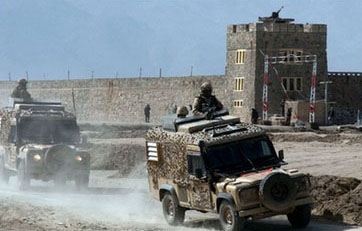By Noor Wali Sayeed Shinwarai
"Khad threw me in prison for being jihadist" Engineer Ewaz Ali Wafa was among thousands of innocent people who were imprisoned in Sadarat (the prime minister's palace) and Pul-e-Charkhi jail in the 1980s. A testimony*
Wafa has many bad memories of torture by security officials of the communist government. He has never dared to share these.
Wafa says in 1983 he was picked up by intelligence agents of the Babrak Karmal government at 3am.
"It was 8th of Aqrab (the eighth month of the solar year). I was lying awake when suddenly I heard footsteps on the roof. Officers of Khad (the dreaded government intelligence services) had besieged the lane next to our house and they were walking on my roof. They took me away on the charge of having links with Jihadist groups," Wafa testifies.
He was taken to the prime minister's palace, a detention centre that evoked fear in everyone. Prisoners screamed in agony as they were tortured in its rooms but the sounds stayed within the four walls.
Wafa says he was taken to a bare room with one chair on the second floor. The interrogation started with slaps and kicks that were followed by electrical shocks and countless lashes.
"That place epitomised terror and barbarity," recalls the engineer.
The physical torture was followed next morning with mental torture. The interrogators told him his brother, who was also brought to the prison, could be saved if he were to confess. If he refused his brother would be tortured.
Unending nightmare
Wafa will never forget how he was taken to a room with a closed door where he heard his brother's screams.
"They did not let me enter. They kept me standing in the corridor. They would neither let me sleep nor stop the torture," he says.
An interrogator could walk in and poke his fingers into a prisoner's eye or kick him till he fainted. When that happened they would administer an electrical shock. "Every interrogator has special tactics to get a confession. They would use foul language against prisoners," he says, adding, "In the night the voices of female prisoners could be heard."

NATO soldiers patrol outside the high-security Pul-e-Charkhi Prison in Kabul. (Photo: Shah Marai/AFP)
The detainees were interred in two parts of the prime minister's palace. One part was newly built, and the other was old, with dark rooms. People were packed into the rooms. "Once my room had 32 people. We could hardly breathe. We had permission to go to the toilet only twice in 24 hours. Our relatives could visit only once in two weeks," he says.
Wafa says prisoners' relatives were not allowed to bring food; they could bring clothes because the government did not want to spend money on clothes for prisoners.
He remembers that when prisoners were transferred to Pul-e-Charkhi the guard would joke they were going in a "boiling pot". "Prisoners were taken in a long bus with no windows, and only one door. They called it boiling pot. I also went to Pul-e-Charkhi in the boiling pot," he says.Things became even worse for Wafa and other prisoners who were interred in the "first and second blocks of Khad". Not only were prisoners here made to wait for at least six months before their cases came up in court, but they were subjected to barbaric interrogation. "When the trail was held it was just for show. The attorney was not there to defend the prisoner. The voice of the prisoners could not be heard. Everything that happened was at the wishes of the Khad. It could make you laugh and cry simultaneously," he says.
No justice
Wafa says when his case came up in the trial court and he was defending himself, the judge went off to sleep. "For 5 minutes I was addressing the judge and he was sleeping. I knew he did not hear a word. But he told me, 'Okay, finished. Sit'."
Wafa thought the judge would deliver the verdict, but he did not. Instead he was taken out of the court, handcuffed, and made to wait four months for the judgement.
Wafa says he was taken to the fifth and sixth block after the trial. It is from here that the police would take groups of prisoners in buses to the Polygon area "where they were shot and buried in mass graves," he says.
Sometimes prisoners were taken to Polygon, and buried alive.
Wafa was luckier. He was sent to the fourth block - known as Shanzda Bist (long, trailer truck). There were many political prisoners. Here things were a "bit better". "Most of the prisoners had books," he recalls.
Wafa too got a chance to study. "Many university lecturers, and religious scientists were there. All were studying Islamic books. We were reciting the Holy Quran. There were academic discussions and sports too," he says.
Wafa spent four years in jail, and was released under a general amnesty by President Najibullah. He was conscripted into the army, but escaped after a few months, he says.
* The testimonies of survivors of war crimes are our contribution to creating greater public awareness about people's hopes and claims for justice, reconciliation and peace. These testimonies and life stories are the basis for a radio drama that is being broadcast by seven Killid radios.



